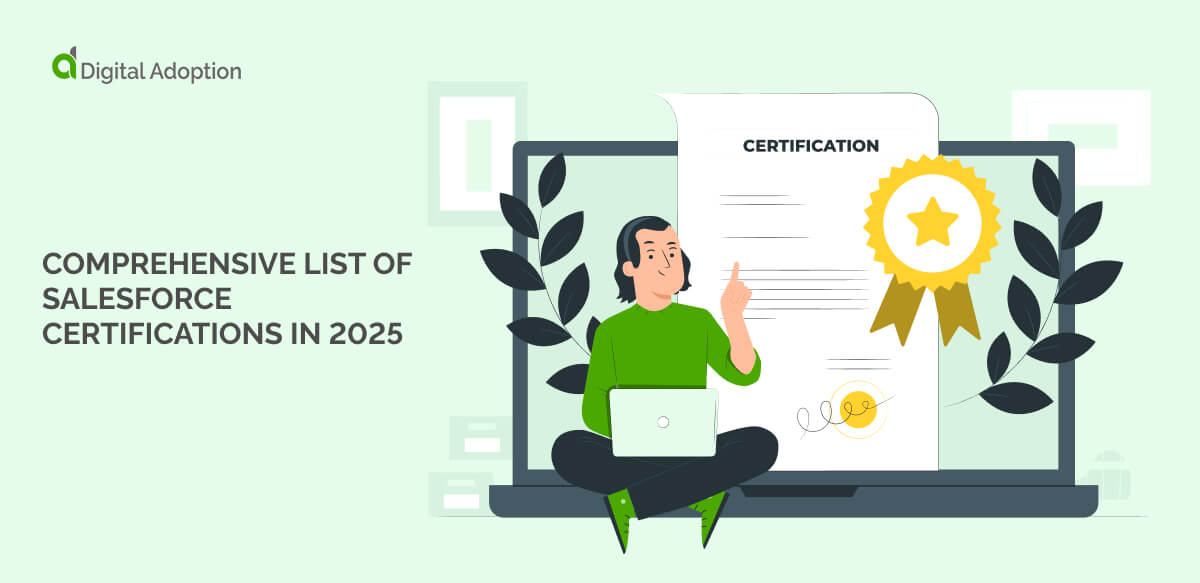Which job titles should you look for if you are interested in digital transformation jobs?
Because digital transformation can involve so many types of organizational change, a variety of roles are involved in digital transformation projects.
Commonly, these include:
- IT professionals, such as CIOs
- Change managers
- C-level executives
- Digital adoption managers
- Human resources professionals
- Third-party specialists in IT or digital transformation
In most cases these jobs will work together during a single digital transformation project – normally, no single job is responsible for handling the entire project.
Below, we will look at digital transformation and digital transformation jobs in more detail.
But first, let’s clarify what we mean by digital transformation.
Digital Transformation: A 30-Second Primer
Digital transformation is a type of organizational change that involves the integration of technology into each business area.
Businesses undertaking digital transformation efforts typically use technology to make changes to:
- Business processes
- Products and services
- The customer experience
- Day-to-day workflows
- Culture
- Business models
And so forth.
Because digital transformation projects can vary widely in scope, so too can the jobs that are involved.
Let’s look at some of the jobs and roles that are often involved in digital transformation projects.
Common Digital Transformation Jobs and Roles
Digital transformation is a type of organizational change.
Therefore, most digital transformation jobs will revolve around enabling, managing, leading, or otherwise facilitating that change.
Here are a few examples:
- Change Managers – Change managers specifically organize, plan, manage, implement, and optimize organizational change projects. Today, they are frequently involved with digital transformations or other changes that relate to digital technology.
- CIOs – The role of the CIO is changing. Today, they are becoming more involved in strategic decision-making that involves digital technology. Given the crucial business value that technology adds in today’s workplace, this should come as no surprise.
- Business Leaders – Naturally, C-level executives and other business leaders often play a role in digital transformation projects. In enterprises, executives will often sponsor or lead digital transformations.
- Digital Adoption Managers – Digital adoption managers oversee the deployment, integration, and adoption of new digital tools. In enterprises, effective digital adoption can improve employee proficiency, productivity, and ultimately a software platform’s value.
- Training Managers – During digital transformation projects, training managers will often be tasked with training new employees on software and workflows. The more effective the training, the more productive employees will be.
- Human Resources Professionals – Human resources are also becoming more involved when it comes to workforce development, skills training, and the workplace experience. In other words, they are also responsible for keeping employees competent, satisfied, and productive.
The exact role that each job plays will vary greatly, depending on the organization, the nature of the digital transformation, and the individual circumstances.
Common Tasks and Responsibilities During Digital Transformation Projects
As mentioned, the nature of any digital transformation initiative can vary widely.
However, since they are organizational changes that revolve around digital technology, many of them follow the same pattern.
That is, organizations must adopt digital technology, upgrade processes and procedures, and modernize the workplace.
Here are a few common duties that come with many digital transformation initiatives:
- Employee training. Whenever a business adopts new digital tools, employees must learn to use that software. This learning curve can impact productivity, proficiency, and more. Effective employee training helps minimize learning time, reduce employee frustration, and maximize proficiency.
- Risk mitigation and management. Every organizational change project comes with risk. Project leaders must assess that risk and take measures to prevent, mitigate, and reduce that risk as much as possible.
- IT modernization. IT departments must work closely with business leaders to determine which tools are best-suited to their needs. The right tools can deliver a competitive advantage, meaning that IT’s role is becoming more directly involved with business strategy.
- Changing business processes or practices. Digital transformation often changes the way people work. Adopting a new CRM platform, for instance, can result in new workflows, processes, procedures, and so on. These changes can require onboarding, training, departmental restructuring, and so forth.
- Creating a streamlined employee experience. Organizational change is not easy. Employee resistance and frustration is common, which can hinder the results of a change project, lower productivity, and more.
- Developing new digital strategies. In the digital economy, businesses must frequently employ innovative strategies that leverage new technology. Because technology can offer such significant competitive advantages, IT leaders are becoming more involved in such decision-making.
- Project management. Digital transformation projects can be short, long, straightforward, or complex. Regardless of the nature of the specific transformation project, these projects must be managed.
Of course, this list is hardly comprehensive.
Every digital change initiative is unique and will involve a unique set of responsibilities – and therefore, a unique set of jobs.
However, as mentioned, most digital transformations revolve around digital technology and organizational change.
Therefore, most jobs will be those that involve change management or technology.

 FACT CHECKED
FACT CHECKED





![18 Examples of AI in Finance [2025]](https://www.digital-adoption.com/wp-content/uploads/2025/06/18-Examples-of-AI-in-Finance-2025-300x146.jpg)
![14 Examples of AI in Manufacturing [2025]](https://www.digital-adoption.com/wp-content/uploads/2025/06/14-Examples-of-AI-in-Manufacturing-2025-300x146.jpg)




